Ata-ul-Haye Nasir, Al Hakam
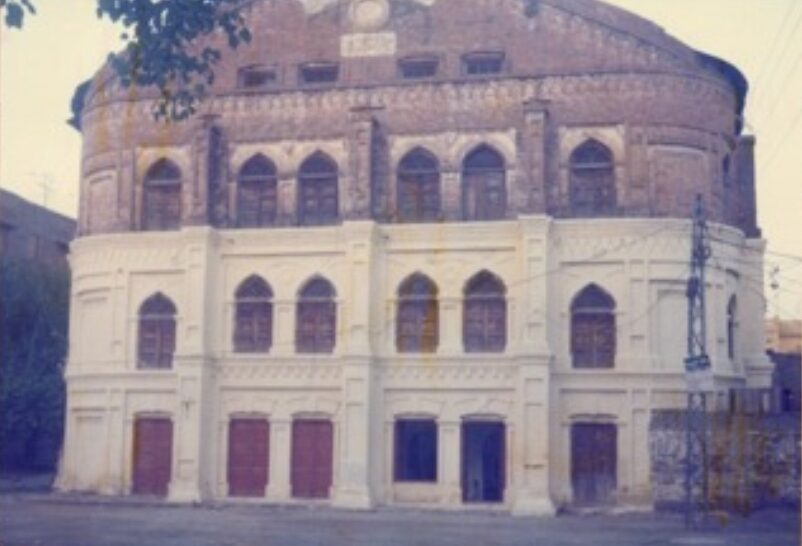
Hazrat Musleh-e-Maudra delivered a lecture at the Bradlaugh Hall in Lahore, on 2 March 1927, titled “Hindu-Muslim Fasadat, Inka Ilaaj, Aur Musalmanon ka Ainda Tareeq-e-Amal”, i.e., Hindu-Muslim Relations and the Future Line of Muslim Conduct. It was published in Al Fazl on 15, 18 & 22 March 1927.
The Civil and Military Gazette reported:
“Hindu-Muslim Relations
“Powerful Appeal For Mutual Toleration
“Hazrat Mirza Bashir-ud-Din Mahmud Ahmad, Head of the Ahmadiyya community, gave a very significant speech on ‘Hindu-Muslim Relations and the Future Line of Muslim Conduct,’ on Wednesday, March 2. The Hon Sir Muhammad Shafi, K.C.S.I., was in the chair. The hall was packed to its fullest capacity and both communities were amply represented by leading members.
“The lecturer traced the origin of the Hindu-Muslim disturbances to two causes, viz., the absence of religious toleration and political injustice. Both these traits in the Indian character, he remarked, were the inheritance of past Indian history, for which the present generation was not responsible. Therefore, instead of quarrelling amongst themselves and making matters worse, both communities should try to bury the past and make mutual efforts to forget and forgive. He appealed strongly to both communities, in the name of their respective religions and in the name of their country, to cultivate the virtues of broad-mindedness and fair play which were greatly needed to develop national life in India. The lecturer was listened to with deep attention by an appreciative audience.” (The Civil and Military Gazette, 5 March 1927, p. 5)
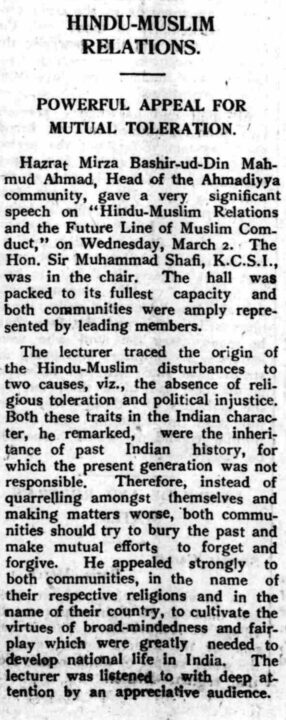
The president of the session, Sir Muhammad Shafi said in his welcoming speech:
“In my view, the time has come for the well-wishers and sympathetic people to raise their voices and say that those who are causing the clash between different communities of India are in fact, the enemies of the country. Since, there are such difficulties in India, thus, today Mirza Sahib will tell you the suitable solution to all these [problems], through which, hopefully, the country’s situation will improve and these problems will cease to exist.” (Al Fazl, 15 March 1927, p. 5)
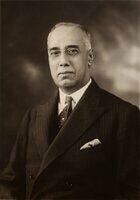
At the beginning of his speech, Hazrat Musleh-e-Maudra said that in his view, no one could remain unaffected by the painful impacts of the disturbance and unrest between Hindus and Muslims of India, and regardless of whichever religion, community, belief, or school of thought they belong to, if they have any sympathy for their country, they must be distressed upon seeing this situation.
Progress requires peace
Huzoorra continued:
“In my view, no religion, civilisation, or politics can ever progress until there is peace. Just like crops cannot flourish without water, progress is impossible without peace. […] India is that unfortunate country where, instead of delivering such speeches which may establish peace and enable people to progress under a peaceful atmosphere, people deliver speeches which flame the unrest, intensify the communal and sectarian hate, and tarnish the country’s peace. Consequently, as a country, India’s progress is at a halt. […] Here at the same Bradlaugh Hall, I delivered a speech around 4 to 5 years ago [delivered on 14 November 1923, “‘We must recognise the rights of every community’: Hazrat Musleh-e-Maud’s lecture at Bradlaugh Hall, Lahore”, Al Hakam, 11 November 2022, Issue 243, pp. 8-9)]. On that occasion also, I had expressed my views on the conciliation between Hindus and Muslims.” (Al Fazl, 15 March 1927, pp. 5-6)
Reasons behind the unrest
Further, Huzoorra shed light on the reasons behind the unrest between Hindu and Muslim communities. Huzoorra said that the main reasons included political injustice, inequality, and religious intolerance:
Religious tolerance
“The strong foundation of religious tolerance which is present in Islam, is not found anywhere else. […] On one hand, where Islam teaches [its followers] to present its distinctive features – which means that its own hallmarks be presented [as an argument of truthfulness] – on the other hand, it also teaches that prophets have come in every nation which has existed in this world, as it states:
وَاِنۡ مِّنۡ اُمَّۃٍ اِلَّا خَلَا فِیۡہَا نَذِیۡرٌ
“‘And there is no people to whom a Warner has not been sent.’ [Surah Fatir, Ch. 35: V. 25]
“Now look, how great the difference is between Islam and other religions. It has not been stated in other religions that apart from them, prophets have come in any other nation as well. However, it is the teaching of Islam which tells that prophets have been coming to all nations. Now, in light of this teaching, the Muslims are obliged to believe in prophets of all nations, and when they do so, could they ever say to any community that ‘your prophet is false’? If anyone says this, they will not only be falsifying that certain prophet, but rather, they would be falsifying [God forbid] this verse of the Holy Quran. […] A Muslim honours each of them [prophets], and utters respectful and honourable words for them. When the Holy Quran states, وَاِنۡ مِّنۡ اُمَّۃٍ اِلَّا خَلَا فِیۡہَا نَذِیۡرٌ, every Muslim will be obliged to accept that prophets have come in Hindus as well since Hindus are also a nation in this world. And when they will have to accept this, how could it be expected from one to abuse the holy personages of the Hindus.
Hazrat Krishanas and Ramchandaras were prophets
“I believe that Krishanas and Ramchandar Jias were prophets, though it is possible that other Muslims may disagree with me, but they still cannot disrespect [Hazrat Krishanas and Ramchandar Jias]. If they cannot say good, they should not disrespect either, since they are all followers of the Holy Quran. In the Holy Quran, it has been stated that ‘there is no people to whom a Warner has not been sent’. This teaches Muslims that they should not disrespect the prophets of any other community because they are sent by God. However, as far as I know, Hindus cannot present such a teaching in comparison, in which they have been taught religious tolerance through a teaching of this kind, and through which they could learn to respect the holy personages of other religions. However, I respect Krishanas and Ramchandar Jias, since, in accordance with the teaching of the Holy Quran, they were prophets. […]
Prophets in all countries
“The religious tolerance which has been taught in relation to different communities, has also been taught in regards to different countries. Therefore, I can say that if a prophet had come to India in light of this verse, then [a prophet] would have also come to China, as Confucius came there as a prophet. […] Thus, in light of this teaching of the Holy Quran, a Muslim can never disrespect the prophets of any other community or country. In light of this teaching, a Muslim cannot disrespect any prophet who came amongst the Hindu, Christian or Jew communities. The same is the case with the prophets of all countries, they cannot disrespect them, whether a prophet came to France, Japan, Germany, Russia, Iran, Africa, or America. […] The nur [divine light] of God shines in whichever nation He desires. For this reason, I respect each and every one of them. This is what the Holy Quran teaches me, and with respect to this teaching, I can say that due to this [teaching], it is impossible for me to disrespect the people of other religions. Thus, this is the religious tolerance that Islam has established and taught.
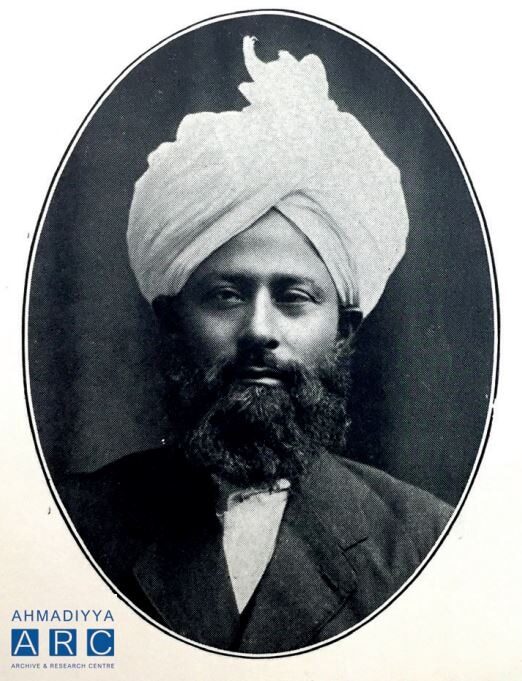
Never disrespect the holy personages of others
“If everyone understands the points which have been stated, and the Hindus also begin to act upon the point that they should not disrespect anyone’s religious holy personages, then religious tolerance can be established. […]
Faith and Patriotism
“If one ponders over this, they will find that it is Faith and religion which inculcate patriotism. As it is stated [by the Holy Prophetsa]:
حُبُّ الْوَطَنِ مِنَ الْاِيْمَانِ
“[‘Love for one’s country is part of faith.’ (Mauzu‘at-e-Kabir, by Mulla Ali Qari, p. 35, published from Delhi in 1315 Hijri)]
“However, if one abandons the Faith and only adopts patriotism or gives it precedence over the Faith, then neither one’s Faith remains intact, nor the patriotism, because patriotism does not instil Faith in a person, but rather, it is Faith which inculcates patriotism in them. […]
The need for tolerance by both the Hindus and Muslims
“If the two major communities of India [Hindus and Muslims] adopt these points, they can live in comfort, however, if they act against it, as they are doing currently, then a peaceful life is a far cry, they cannot even sustain their being. […]
Hate is being spread
“Since I am here to speak justly, I say it categorically that the reason why the Muslims do not cooperate with the Hindus is that they presume that the Hindus, due to their strength, will harm them and will not treat them in a just manner. And the Hindus do not show tolerance towards the Muslims because the Muslims are in the minority, and they [Hindus] wish to expel them from India. If the Muslims are treated by the Hindus with tolerance, they can easily join hands with the Hindus, however, it is not happening. Moreover, I witness that in addition to religious intolerance, religious hate is also being flamed. Such [hateful] rhetoric is used verbally and also books are written in which the prophets are abused and the holy personages of the Muslims are disrespected. All of such acts flame the hateful and disrespectful sentiments, which cannot allow the communities to live in comfort and they cannot live a peaceful life.” (Al Fazl, 15 March 1927, pp. 7-9)
Did Islam spread through force?
After this, Huzoorra mentioned that in addition to publishing books to spread disrespect and hate against Muslims, another notion which is being spread by the opponents of Islam is that the religion of Islam has spread through force. Huzoorra refuted this false allegation in detail and stated that “there is no commandment in Islam which teaches the usage of force for tabligh and propagation [of religion].” (Al Fazl, 18 March 1927, pp. 5-7)
Islam granted peace to everyone
Huzoorra continued:
“The Hindus complain that ‘Islam has used force, and caused the unrest’, however, Islam has established peace in such great manner that one does not find its example even in the religion of Hindus. In India itself, Islam became a source of peace. […] Islam has never used force, but rather, it has advocated peace and granted a teaching of peace. […]
The acceptance of Islam by the Malkana Rajputs
The community among the Hindus which accepted Islam the most are the [Malkana] Rajputs, about whom the Hindus claim that they had been converted to Islam by force. There is no doubt that the Rajputs had accepted Islam the most among the Hindus, however, there is also no doubt that the Rajputs were a very brave and courageous community within India. For this reason, one wonders how this brave and courageous community was ‘compelled’ to accept Islam, or that this community accepted Islam ‘with the fear of the compulsion by the Muslims’. […] The Rajputs have always been the fighters, they could have ‘defended’ against the ‘force used by the Muslims’. […] This also shows that the Muslims had not used force, and Islam also never gave such teachings as to convert people to Islam by compulsion.

Islam does not require the usage of force
“In addition to all these points, I will now tell you that Islam does not require the usage of force. The Holy Quran states:
لَاۤ اِکۡرَاہَ فِی الدِّیۡنِ ۟ۙ قَدۡ تَّبَیَّنَ الرُّشۡدُ مِنَ الۡغَیِّ
“Meaning, ‘There should be no compulsion in religion. Surely, right has become distinct from wrong.’ (Surah al-Baqarah, Ch. 2: V. 257)
“God Almighty has stated the reason why Islam does not require compulsion. Islam does not require any compulsion because قَدۡ تَّبَیَّنَ الرُّشۡدُ, meaning ‘Surely, right has become distinct’. […] Through Islam, the truth and nur [divine light] have become distinct from misguidance and ignorance, and there remains no need for compulsion. The truth and nur comprise the power to attract people. Thus, since Islam is the truth and nur, it does not need any compulsion. […]
There is peace in every Islamic teaching
“The fact that God Almighty has named it ‘Islam’, manifests that this religion will advocate peace and harmony, instead of compulsion and violence, since the word ‘Islam’ means to be in peace and to give peace. It is utterly wrong to imply about a religion that it uses compulsion, while its name has such meanings that it is peace, remains peaceful, and grants peace to the world.” (Al Fazl, 18 March 1927, pp. 7-8)
Do not abuse the Holy Prophetsa
Mentioning the anti-Islam rhetoric and disrespectful literature published against the blessed life of the Holy Prophet Muhammadsa, Huzoorra said:
“We can endure everything, but one thing which we cannot endure is the disrespect of that holy person, we cannot endure abuses about that holy person. He is the one who established peace in the world, gave the teachings of peace, turned barbarous people into civilised ones, and brought the world into the light from darkness. Thus, we can bear anything, but cannot endure abuses about the Holy Prophetsa. […] However, we will neither create any chaos, nor it is the teaching of the Holy Prophet Muhammadsa.” (Ibid., pp. 8-9)
Huzoorra then quoted the following excerpt of the Promised Messiahas:
“I declare that it is possible for us to make peace with the serpents fed on brackish soil and the wolves of the wilderness, but not with those who make wanton attacks on our Holy Prophet (may peace and blessings of Allah be upon him) who is dearer to us than our lives, our mothers and our fathers. May Allah cause us to die as Muslims. We are not willing to do anything at the cost of our faith.” (A Message of Peace, pp. 30-31)
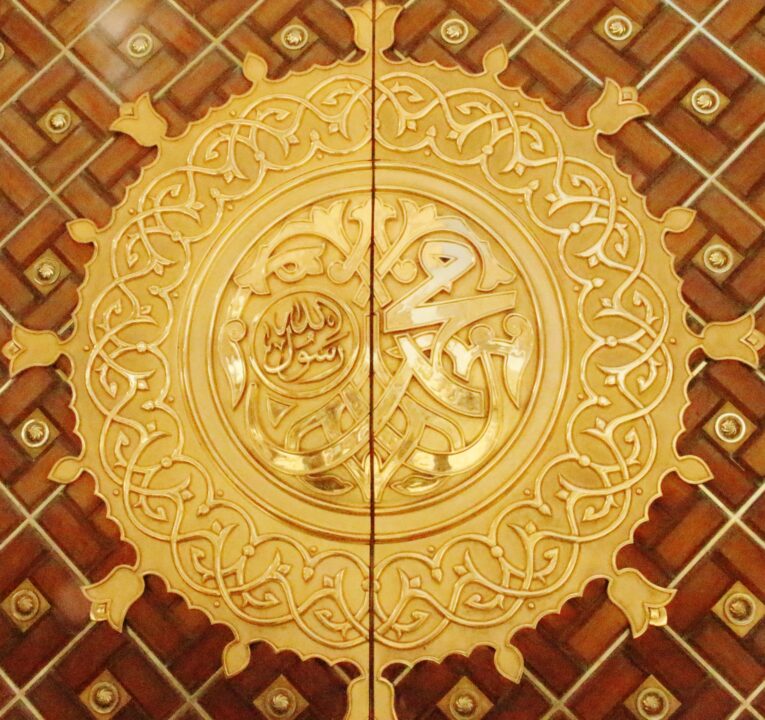
Duty of Muslims and the need to be on guard
Hazrat Musleh-e-Maudra continued by advising the Muslims that “If the Muslims have any respect for Islam in their hearts, they are required to awaken themselves. […] If the Muslims have any pain for Islam, if they desire for Islam to progress, and if they want that the Muslims stay firm on their Faith instead of converting to other religions, then the Muslims themselves are required to become [true] Muslims. They should not disobey any commandment of Islam, despite having the ability to act upon it. Thus, I advise that if you will care for the future now, then you will be able to succeed. […] If you will not save those Malkanas whose shuddhi [conversion to Hinduism] is being carried out, then others will also be made shuddh [converted to Hinduism] in the future. God Almighty states in the Holy Quran:
یٰۤاَیُّہَا الَّذِیۡنَ اٰمَنُوا اصۡبِرُوۡا وَصَابِرُوۡا وَرَابِطُوۡا ۟ وَاتَّقُوا اللّٰہَ لَعَلَّکُمۡ تُفۡلِحُوۡنَ
“[O ye who believe! be steadfast and strive to excel in steadfastness and be on [your] guard and fear Allah that you may prosper. (Surah Aal-e-Imran, Ch. 3: V. 201) […]
“Hence, we are required to be on our guard by remaining vigilant, and to save our weaker communities – which are our ‘boundaries’ – from the reach of our opponents. Malkanas are also our ‘boundary’, and it is our important duty to protect them. The propagation and protection of Islam are incumbent upon us. The Muslims need to fulfil this duty which is an obligation for them and to become [true] Muslims themselves as well. […]
The future conduct of the Muslims
“Now I wish to advise the Muslims a plan for the future which they should follow, and which they really need at the moment. […] I will tell you the truth that the first and foremost method for success and protection is for us to become true Muslims.
Take precautions (tadbir)
“Along with the foremost point which I have stated, i.e. to become true Muslims, the second point that I will advise, which is also very essential, is precaution [tadbir]. It is a distinctive feature of a Muslim to take precautions. Moreover, a Muslim knows, and I say it in particular, that my religion teaches me to act with precaution, instead of remaining idle and hoping for everything to happen itself. The religion of the Muslims does not advocate this, but rather, it teaches one to take precautions at all times. […] A Muslim’s duty is to always take precautions and along with it continue the prayers, and then put their trust in God. In the same way, I also wish to advise you that on the one hand where you become Muslims in true essence, on the other hand, also take necessary precautions. […] One ought to devote themselves to God. Thus, if you will devote yourselves to God, then whenever the opponent will attack you, God Almighty will Himself protect you, since He does not let His servants be ruined, and saves them from becoming prey to the attacks of the opponents.
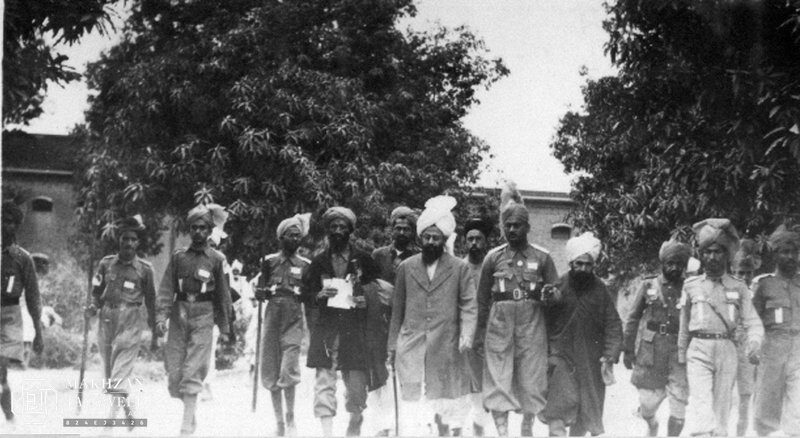
Reform yourselves
“It is stated in the Holy Quran:
اِنَّ اللّٰہَ لَا یُغَیِّرُ مَا بِقَوۡمٍ حَتّٰی یُغَیِّرُوۡا مَا بِاَنۡفُسِہِمۡ
“[Surely, Allah changes not the condition of a people until they change that which is in their hearts. (Surah al-Ra’d, Ch. 13: V. 12)] […]
“The contemporary Muslims have abandoned their connection with God, for this reason, He has also turned Himself away from them. As a result, they lack the courage which is found in God’s servants, and due to this, they fear weaker people as well. […] The condition for the progress of the Muslims is for them to devote themselves to God, and when God befriends someone, then no one can halt their progress.” (Al Fazl, 22 March 1927, pp. 5-6)
Need for Muslim unity and fulfilment of each other’s rights
Huzoorra continued by emphasising the need for unity among the Muslims:
“The point which is essential for creating unity and harmony among all sects of the Muslims is for them to take care of the rights of each other. In this way, with unison as a community, they will be able to take care of the rights of other non-Muslim communities as well.
‘You are the best people raised for the good of mankind’
“In the Holy Quran, you have been called the best of the people, and the reason for calling you the best has been stated that you enjoin what is good and forbid evil. Therefore, it is stated in the Holy Quran:
کُنۡتُمۡ خَیۡرَ اُمَّۃٍ اُخۡرِجَتۡ لِلنَّاسِ تَاۡمُرُوۡنَ بِالۡمَعۡرُوۡفِ وَتَنۡہَوۡنَ عَنِ الۡمُنۡکَرِ
“‘You are the best people raised for the good of mankind; you enjoin what is good and forbid evil.’ (Surah al-e-Imran, Ch.3: V.111) […]
“Therefore, the only reason behind the Muslims being the best of the people, is only due to tabligh [preaching], and if they abandon tabligh, how can they be called the best of the people? I advise that if you wish to progress, in fact, you must have the desire to progress, then you ought to carry out tabligh. […]
Muslims need to acquaint themselves with their Faith
“For tabligh and also for general requirements, it is essential for the Muslims to acquaint themselves with their Faith since I have seen that in response to a small objection, the Muslims get worried. If one has full acquaintance with their Faith, then they will never get frightened over any objection. However, if one is not acquainted with their Faith themselves, how can they preach about their Faith to others? Moreover, as a result of being unacquainted with their Faith, Muslims are negligent in their responsibilities as well. […]
Establish schools
“Then, the current decline of the Muslims requires them to establish madaris [schools] for the Muslim children, where they may get high quality [religious] education. Thus, for the education and training of Muslim children, the Muslims are required to establish such schools at various places, where they could attain worldly and religious education in the best manner. […]
Need for revision of the history books
“Our national character has been somewhat tarnished, and continues to happen, through the history books which are taught in the schools, because in those books the forefathers of the Muslims have been portrayed as thieves, dacoits, and bandits. Thus, when the [Muslim] children read such things, they consider themselves as the progeny of thieves, dacoits, and bandits. Once they mature and acquaint themselves with the true facts through research, these impressions are removed from their minds, however, its impact remains for a long time. […] Hence, there is a huge need for the revision of the current history books. […] Aurangzeb [Alamgir], who was a pious and righteous person, has also been portrayed as a dacoit and bandit in those histories, and [Chhatrapati] Shivaji [Maharaj, an Indian ruler and a member of the Bhonsle Maratha clan] is portrayed as a clever and wise king. The children do not hold that much ability to differentiate as to carry out research, and thus, they remain under the impression that Shivaji was a very clever and wise king, and Aurangzeb a dacoit king. I do not intend here to unnecessarily praise the Muslim kings, however, I wish that the due right should be given to our [Muslim] kings, and they should be praised for what they deserve. […] Since as a result of such traditions, a nation is heavily impacted, thus, there is a need to correct the history books.
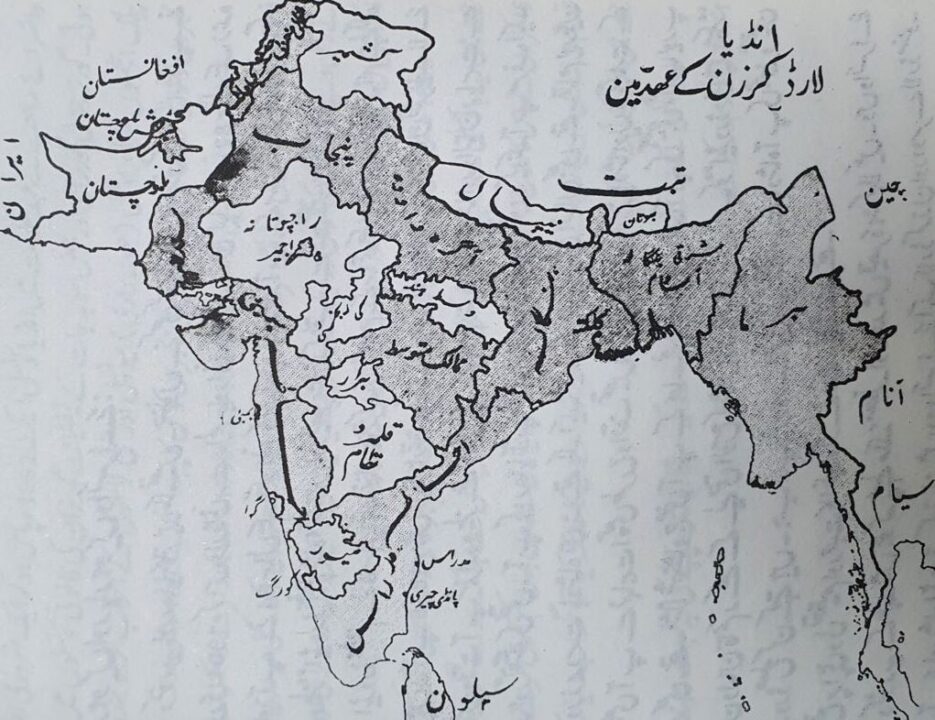
An appeal to Hindus
“On this occasion, I also wish to appeal to the Hindus with true sympathy. By God, I declare that I do not have even the slightest animosity in my heart towards them. However, due to their actions, I feel the pain. Thus, for the sake of country, religion, and humanity, I appeal to them to reform themselves. […] Our country was seen with respect by other countries, however, today they are laughing at us. Therefore, you ought to reform yourselves, help the neighbouring community and get their assistance in return.
An appeal to Muslims
“I also advise the Muslims to […] act with good morals, and do the acts which are a source of pride for the country. Remove from your hearts the grudge, animosity, and discrimination, whether it is against your own people or others. Keep in mind the betterment of the country at each step. Respect your neighbouring communities, and treat them with love and affection.
Concluding words
“I also wish to say that peace cannot be made as slaves, but rather, it is done with freedom, and the one who makes peace, is a respected one in the sight of God. Thus, you ought to do the acts which foster peace. Since God Almighty is pleased with conciliation, thus, I say that make peace for the sake of God’s pleasure. May God enable the people of India to do the acts which please Him, may they serve the nation, and may they strive for the peace and progress of the country. The one who will do so, meaning live with love, affection and harmony, will shine on this world’s crown as a diamond. My desire is that God may make this country and its people shine like diamonds. O God, make this happen. Amin.” (Ibid., pp. 7-8)
President’s closing remarks
After Huzoor’sra speech, the president of the session delivered the concluding speech and said:
“Dear attendees, I thank Mirza Sahib on behalf of myself and all of you that he expressed his valuable views in front of the audience, and taught us such pious lessons that if, hopefully, we act upon, they will prove to be beneficial for the country and nation. I hope that my Muslim brethren will pay heed to and ponder over what Mirza Sahib has advised to both the communities for the country’s betterment.” (Ibid., p. 8)


Hazrat Promised Messiah AS had said that opposition is a catalyst for progress